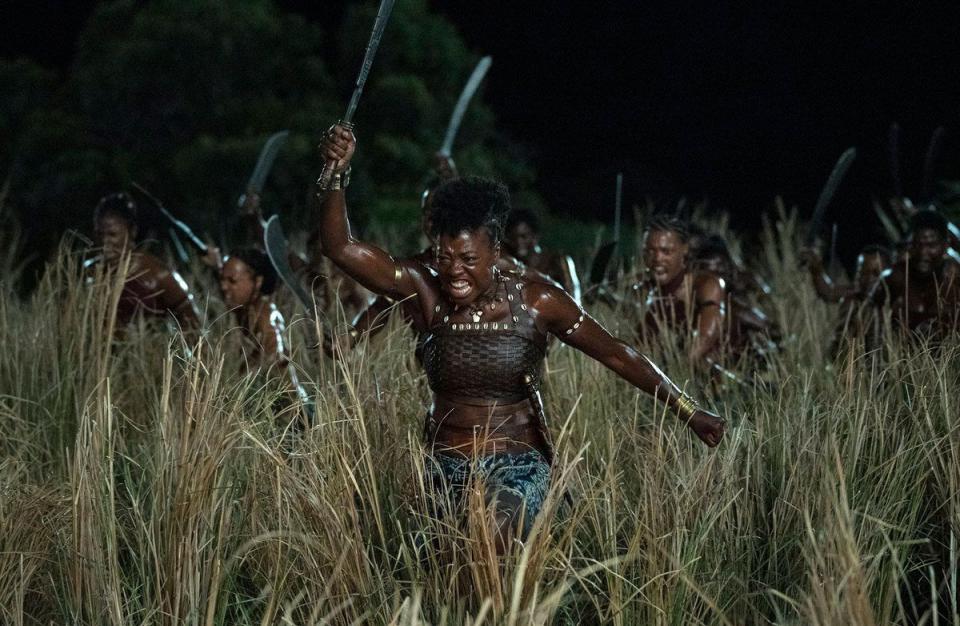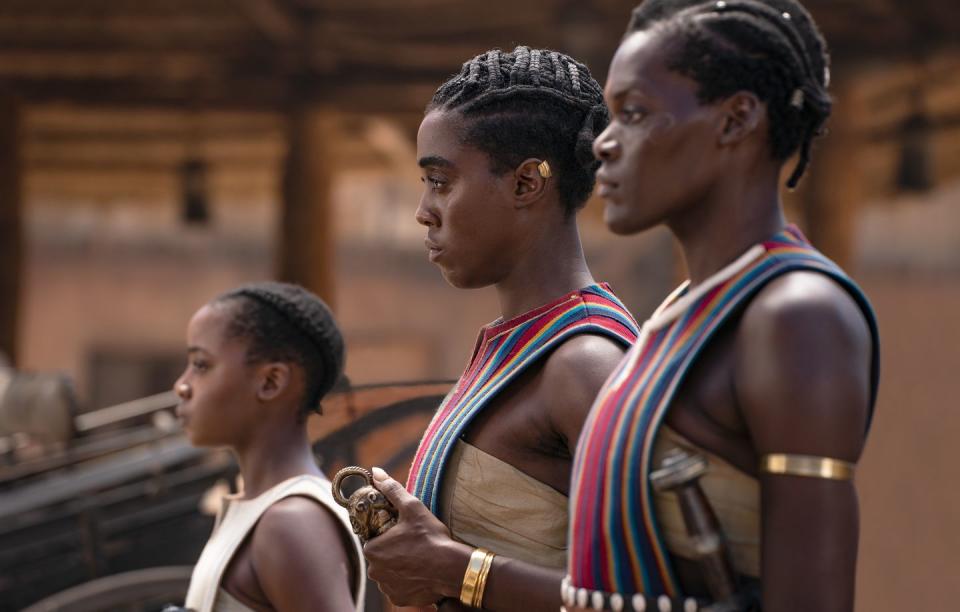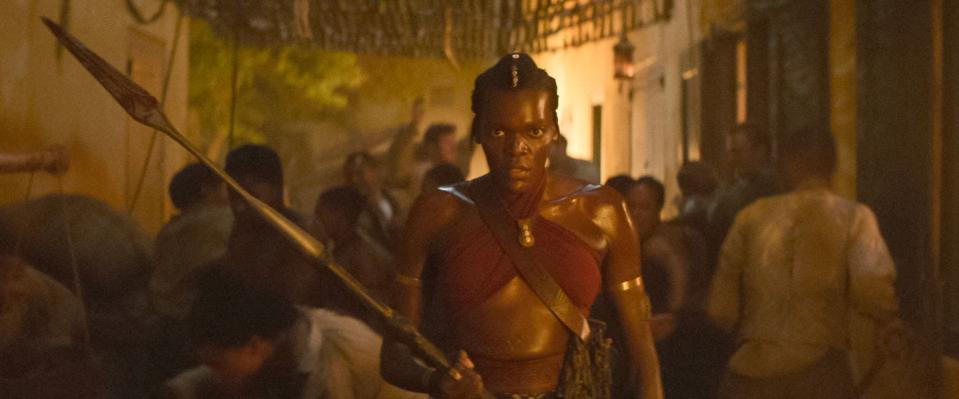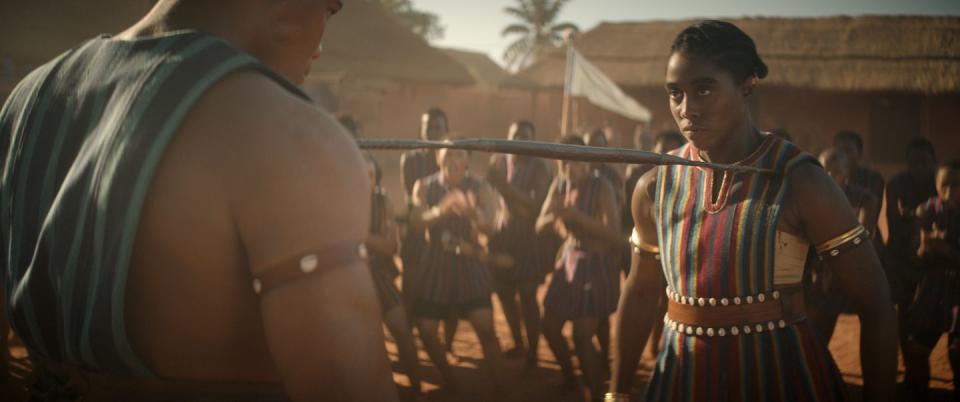The Woman King stars Sheila Atim and Lashana Lynch on fighting like girls
The Woman King is now out in the UK and to say we recommend it would be an understatement. The film, led by Viola Davis as the leader of a band of female soldiers, is an adrenaline-packed, expertly acted, and visceral story.
We spoke with stars Lashana Lynch (No Time to Die, Captain Marvel) and Sheila Atim about feeling the weight of the movie's capital-i-Importance alongside making a good movie.
There's so much heart to the story, but the thing that hopefully people also see is how the action is so interestingly choreographed. I feel like it really plays to the womanhood of these warriors – like those fingernails [on Izogie]. How different was this for both of you?
Sheila Atim (Amenza): I mean, firstly, the degree to which we were doing our own stunts, for instance, was different. The approach to stunts – I'll speak personally – was different as well, it felt very character driven.
It felt very rooted in not just the story of the action itself, but also what each of our characters would do, how we would fight. It felt like it was paired up with not just the personalities, but our physicalities as well. You know, particularly with Amenza and Izogie, you see moments of teamwork on the battlefield, which I think is really great because you've got these two different styles that come together and still are able to work with a synergy.
Gina [Prince-Bythewood, director] said she wanted us to do our own stunts, when we both individually came on to the project. Danny Hernandez and the stunt team were so excited to just create stunts – like, I'm just seeing Danny now!
The passion behind really trying to create something that felt visceral and immersive and real, and kind of transformative was massive on all fronts. And also, we knew that these warrior women were incredible. We wanted to try and be as close to that as we could possibly be.

I think the nails are a real thing, aren't they? They used to harden them in brine so that they could use them as a weapon. So it's, you know, we drew from them, and just went from there.
When you look at playing a character, are you taking into account her whole arc as you approach each scene, or do you sort of stick with each moment as it comes?
Lashana Lynch (Izogie): As soon as you read a good, meaty script, you have everything there for you to play with. And I was glad that Izogie on the page was someone that I was already delighted was being written and would be in the history of cinema.
So, I started with the physical work, wanting to get into her core, literally where she moves from, where she speaks from, where she feels from, what has helped her, get loud or quiet – that her gut is actually listened to, and how much she brings up to the battlefield.

Whether that be the battlefield in her mind or the literal Battlefield, and she's constantly on this journey of dealing with her past and how she is able to use that to encourage these young people that come into the palace to train. She guides them in the most organic way, but also, it's like a healing, therapeutic experience for her, injecting this, this life and this breath into these young women.
Because she's taken so much from Nanisca (played by Viola Davis), and that's almost her mother figure, right? Because she's been there for so long. She's carved out this really special place in the palace, that she's the best one. She's the one in charge of these women. She's the one, the go-to, the one for advice, the one for everything.
And then every so often, you see these moments where you see what she aspires to be, how her past is holding her back, how much fear she has in herself, actually. And it's that fear that drives her to be the best, which then goes into strong Black women and having to be the best and having to be excellent and having to show up every day, [not only] for yourself but also for your people, right? And the way she does that is really commendable, but it's very taxing to go down that route – that she chooses willingly – but is a great payoff.

So seeing her journey on the page... I was able to just see it. I just saw the film. I saw her journey really clearly. And Gina was really up for being collaborative. And having me expressing my notes and all that, her past and everything I'd written for her. And it was just organic. If it's not on the page, you've got a lot of work to do. If it's right on the page, you're just able to just play.
There's all this talk about representation and universality of storytelling, and in cinema, obviously, you're meant to see yourself in films. So often people who aren't seeing themselves in films have to find a way when they aren't telling stories for you or about you. To what extent was knowing that sort of a weight? Or did you focus on making a movie that is a good movie in and of itself — obviously those things play into each other, but I was wondering what your feelings about that were?
SA: For me, personally, I feel like... of course we were aware of the significance of the project as it relates to representation. But when it comes to the actual work and the execution of that work, you have to throw that away because that's going to get in the way. Because then you're worrying too much about the work what's out there already about us, what the ideals are that already exist about Black women.

Don't get me wrong, there had to be an awareness when it came to the sensitivity of hair, for example, or you know, make-up or costume, or what a certain line might mean under a certain lens, but also we were just trying to portray people. I think it's really important alongside the conversation of representation and how important it is to see yourself, that we also just come back to the central human aspect that Black women are not an ideology. We're not a myth, we're not a fantasy and we're not a concept.
So we have to make sure that even in the specificity and the intersectionality of dealing with us and telling our stories, we're still coming back to us as people. It's really important to balance those two things. Otherwise, if we focus too much on one, then it just becomes about that.
I do think that the great thing about this film is it doesn't just appeal to Black women. It makes everyone, absolutely everyone can see themselves in it.
The Woman King is now out in cinemas.
You Might Also Like

 Yahoo Movies
Yahoo Movies 
